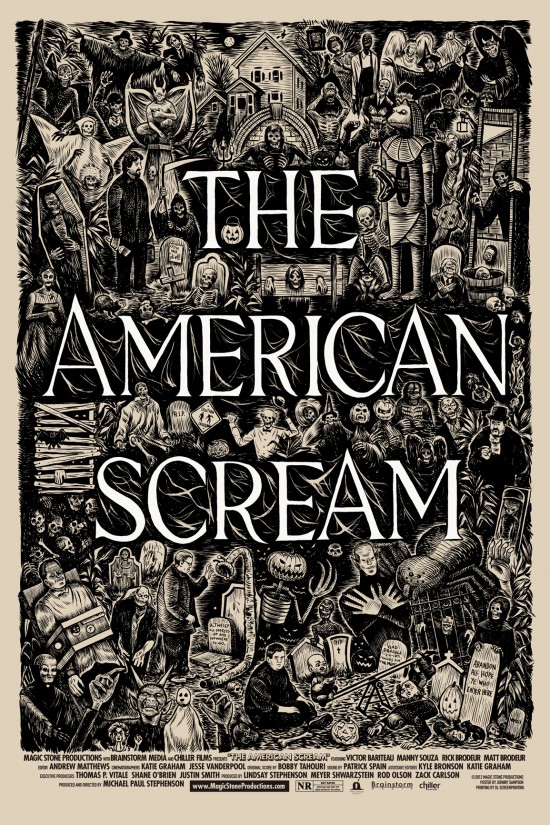'The American Scream' Review: Haunted And Empowered By The Drive To Entertain [Fantastic Fest 2012]
Michael Stephenson earned audience appreciation with his documentary Best Worst Movie, which chronicled the strange fandom evolved to celebrate the rather terrible film Troll 2. While Best Worst Movie was nominally about that 1990 release, one of the real thrusts of the film was obsession, articulated to us as Troll 2 actor George Hardy is introduced to the grinning, enthusiastic followers of his mostly forgotten starring role.
Now Stephenson returns with a new documentary focused on three families who spend months and precious funds assembling "home haunts," which is insider jargon for backyard haunted houses. Though each builder has the same nominal goal — scare and entertain Halloween thrill-seekers — all approach the home haunt interest from a different angle. In The American Scream, Stephenson peers behind the taped-up curtain to find the driving interests for each family, and to celebrate the joy they find in delivering simple scares.
The subjects range from driven to eccentric, and a less humane film would might mock some of these Halloween enthusiasts. This doc edges right up to that line, but never crosses it. More so than the occasionally indulgent Best Worst Movie, The American Scream is a focused vision; it is a sweet, tender portrait of an odd American Dream.
The families on which Stephenson trains his camera all reside in close proximity in Fairhaven, MA, a working-class town just a few miles from where Cape Cod grows out of the Bay State. Despite the unifying factors of location and Halloween interest, however, they couldn't be more different.
Victor Bariteau funnels his repressed childhood desire for big holiday celebrations into an elaborate backyard maze, the creation of which his long-suffering wife reluctantly assists. Manny Souza, inspired by Victor's home-haunting work, assembles his own backyard horror playground out of cast-off materials. Father/son team Richard and Matthew Brodeur, who do occasional work as clowns, seem to be only marginally connected to society, and their backyard work verges on being outsider art. Or, it might simply be incompetent. The film, thankfully, doesn't make a call one way or the other.
There's a clear parallel between home haunting and filmmaking, as we see the amateur process of each haunted house effort, and the big Halloween night debut, when children and adults alike line up to fall victim to jump scares and strobe lights. In the Halloween footage we see a celebration of a simple pleasure, but the road to that night is anything but easy.
The Bariteau family is the most complex unit in the film, as Victor's obsession with creating elaborate haunted house setups overrides the desires of other members of his family. His elder daughter, who enjoys Victor's Halloween work and participates eagerly in its creation, wants a play space of her own, and bitterly understands that her desire is always going to come second on her father's priority list. Victor's wife wants things, too: a bigger house, with more storage room, and more space to work on her own projects. She also knows she's not getting those things any time soon. Stephenson's film could serve as a moment of self-realization for Victor, who seems to recognize his one-sided priorities only occasionally. Assembled into something like a narrative line, the Bariteau story might actually help re-orient his approach to balancing self-interest and family.
The Souza and Brodeur families provide counterpoints to Victor's overriding drive to create his own haunted back yard. Manny Souza seems to have learned from his friend, and while his home haunting is far less accomplished than what fills the Bariteau lot, he has a life that is balanced and dedicated to the strength of his family as a traditional unit. On the other hand, the Brodeur father and son are a strange pair whose nearly inept haunting efforts are balanced by a big-eyed, good-natured approach to life. Seemingly possessed of few friends and deeply settled into a seriously co-dependent lifestyle, the Brodeurs create their strange entertainment almost as a means to relate to one another.
Victor dreams of turning pro, while the Souza and Brodeur clans are happy to entertain their communities. Yet even with Victor's big-time dreams, the final emphasis in The American Scream is on the community spirit of the holiday. That shows in Halloween footage of Victor's exictement at the impact his work is having. One might imagine that as a moment of justification, and in some sense it is, but it also illustrates the unifying force a momentary blast of fear and exhilaration can have. The spirit of the film is suffused with an enthusiasm for that moment of fear and wonder, and an understanding of the strange processes that allow it to happen.
/Film rating: 8 out of 10
Below are a couple of (sadly) low-quality teasers for the film, which premieres on Chiller Sunday October 28. The first promo looks at Victor's family; the second introduces Manny.

